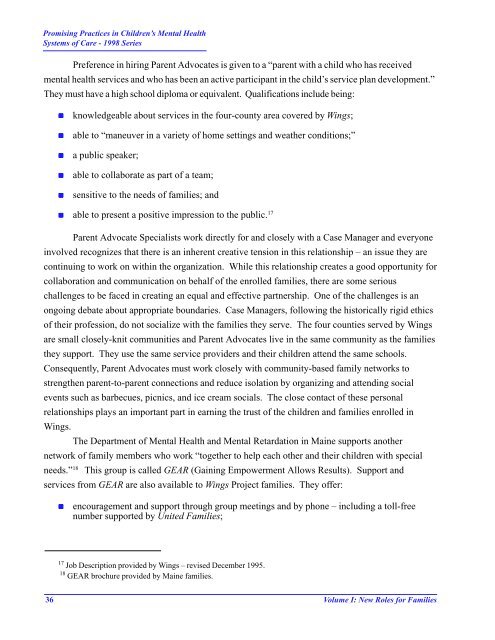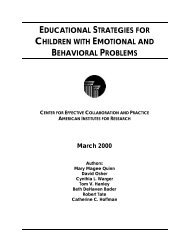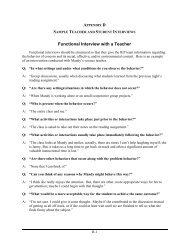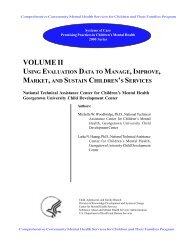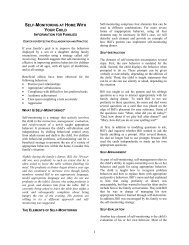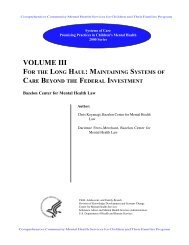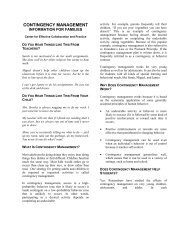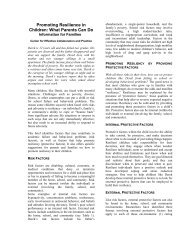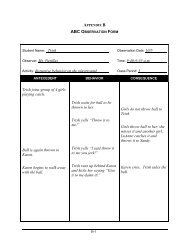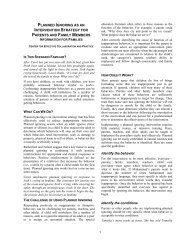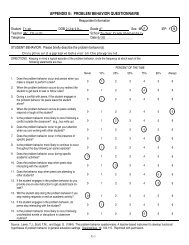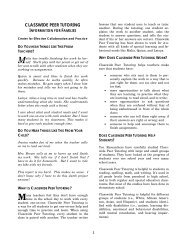VOL 1 - Center for Effective Collaboration and Practice - American ...
VOL 1 - Center for Effective Collaboration and Practice - American ...
VOL 1 - Center for Effective Collaboration and Practice - American ...
You also want an ePaper? Increase the reach of your titles
YUMPU automatically turns print PDFs into web optimized ePapers that Google loves.
Promising <strong>Practice</strong>s in Children’s Mental Health<br />
Systems of Care - 1998 Series<br />
Preference in hiring Parent Advocates is given to a “parent with a child who has received<br />
mental health services <strong>and</strong> who has been an active participant in the child’s service plan development.”<br />
They must have a high school diploma or equivalent. Qualifications include being:<br />
36<br />
n knowledgeable about services in the four-county area covered by Wings;<br />
n able to “maneuver in a variety of home settings <strong>and</strong> weather conditions;”<br />
n a public speaker;<br />
n able to collaborate as part of a team;<br />
n sensitive to the needs of families; <strong>and</strong><br />
n able to present a positive impression to the public. 17<br />
Parent Advocate Specialists work directly <strong>for</strong> <strong>and</strong> closely with a Case Manager <strong>and</strong> everyone<br />
involved recognizes that there is an inherent creative tension in this relationship – an issue they are<br />
continuing to work on within the organization. While this relationship creates a good opportunity <strong>for</strong><br />
collaboration <strong>and</strong> communication on behalf of the enrolled families, there are some serious<br />
challenges to be faced in creating an equal <strong>and</strong> effective partnership. One of the challenges is an<br />
ongoing debate about appropriate boundaries. Case Managers, following the historically rigid ethics<br />
of their profession, do not socialize with the families they serve. The four counties served by Wings<br />
are small closely-knit communities <strong>and</strong> Parent Advocates live in the same community as the families<br />
they support. They use the same service providers <strong>and</strong> their children attend the same schools.<br />
Consequently, Parent Advocates must work closely with community-based family networks to<br />
strengthen parent-to-parent connections <strong>and</strong> reduce isolation by organizing <strong>and</strong> attending social<br />
events such as barbecues, picnics, <strong>and</strong> ice cream socials. The close contact of these personal<br />
relationships plays an important part in earning the trust of the children <strong>and</strong> families enrolled in<br />
Wings.<br />
The Department of Mental Health <strong>and</strong> Mental Retardation in Maine supports another<br />
network of family members who work “together to help each other <strong>and</strong> their children with special<br />
needs.” 18 This group is called GEAR (Gaining Empowerment Allows Results). Support <strong>and</strong><br />
services from GEAR are also available to Wings Project families. They offer:<br />
n encouragement <strong>and</strong> support through group meetings <strong>and</strong> by phone – including a toll-free<br />
number supported by United Families;<br />
17 Job Description provided by Wings – revised December 1995.<br />
18 GEAR brochure provided by Maine families.<br />
Volume I: New Roles <strong>for</strong> Families


